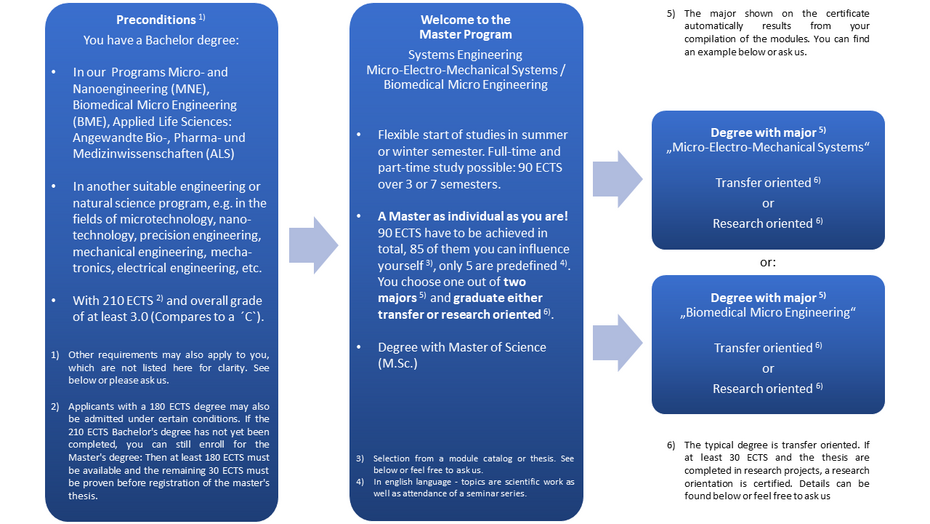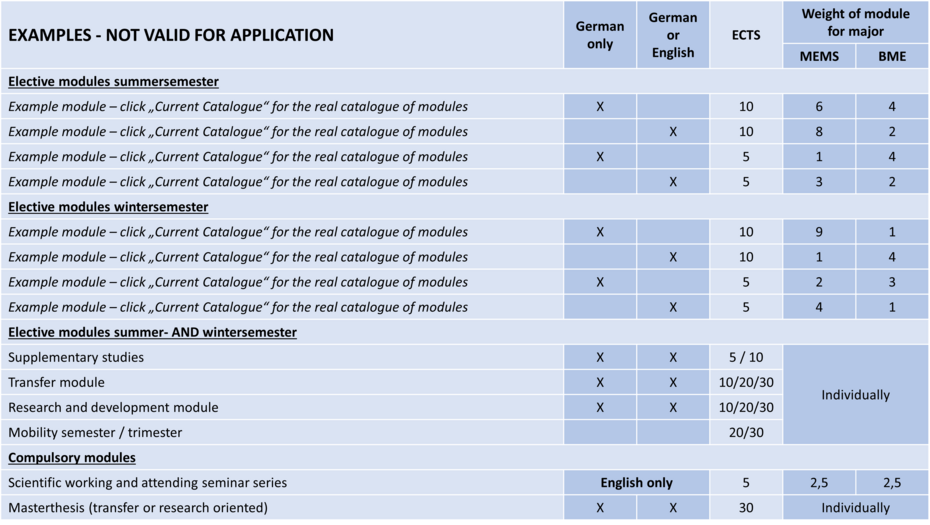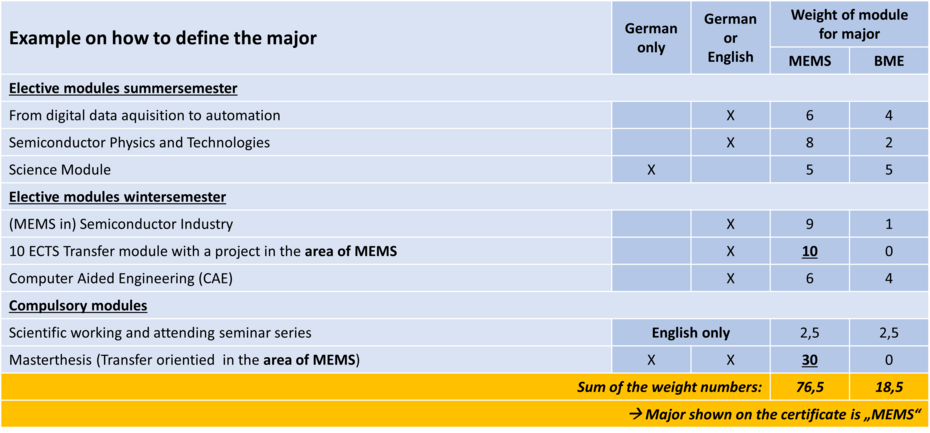
The following figure shows schematically the principle structure of the master. More details can be found in the further text.
Examples of elective modules, in German or English language
All modules are self-contained and take place in one semester. There is only one exception to this: The English-language compulsory module "Scientific work and attendance of the seminar series". This compulsory module has 5 ECTS over 2 semesters, which results in different numbers for the necessary ECTS per semester.
The table shows exemplary modules as they could be chosen for the different semesters. There are modules with 5 ECTS and with 10 ECTS.
The real catalogue of modules for the coming semesters you find in the tab "Current catalogue".
Select your desired modules from the catalog. Choose a total of 30 ECTS in the summer semester and 25 ECTS in the winter semester. This compensates the compulsory module "Scientific work and attendance of the seminar series" with 5 ECTS.

Please note that some modules are offered only in German and some in German or English! The future goal is to offer the Master's program completely in English. For now the following applies: As soon as one of the bilingual modules is attended by non-German speaking students, the module will take place in English.
How to define the major
There are two possible majors, either "Micro-Electro-Mechanical Systems (MEMS)" or "Biomedical Micro Engineering (BME)". The major shown on the certificate results automatically from the choice of modules, which are weighted differently for each major.
An example shows the module choice of Jane Doe. In addition to the lecture modules, she also completed an individual engineering module and a final thesis in the field of MEMS. The weighting numbers of the lecture modules result from the table above, the numbers for the engineering module and the final thesis were determined individually for her projects. Summing up the individual weighting numbers, clearly the resulting major is "MEMS", which will also be shown on the certificate.

Supplementary studies
This module is a substitute for individual lectures that are not included in the module catalog. An example explains it best: You enter the Master as a Bachelor MNE or Electrical Engineering and want to attend special basic courses in the ALS Bachelor. If this would be e.g. a 2 ECTS and a 3 ECTS course, these courses can be credited with the module "Ergänzende Vertiefungen 5 ECTS". Analogously, this applies to 10 ECTS. However, this must be checked in each individual case, especially with regard to the course of study.
Transfer and Research orientation
The program is generally considered to be transfer oriented. If the student wishes to sharpen his/her individual profile, there is the option of attending transfer modules, within which a project can be tackled. For details and requirements see below.
If at least 30 ECTS are earned in research&development modules and if, in addition, the Master's thesis is research-oriented, the degree program is considered to have been completed with a research orientation. This will be indicated accordingly on the certificate. Please note: The projects of the modules and the thesis must be recognized as research&development in a separate consideration prior to commencement. See below for details and requirements.
Transfer module
This module is about strengthening the engineer in the student and giving the opportunity to individualize and focus on specific topics. In comparison to the research & development module, the transfer module empgasizes more on solving a problem than on finding fundamentally new knowledge. Therefore, the transfer module does not count for the research oriented degree.
A 10 / 20 / 30 ECTS module is available. The module can be completed externally (company, institute, partner university) as well as with Kaiserslautern University of Applied Sciences. This is especially interesting if you study "with a company", however, the project must be suitable.
Some details:
- Before the more in-depth engineering modules (20/30 ECTS) can be chosen, the 10 ECTS engineering module must be passed.
- Together, the head of the study program and the supervising examiner decide wether the project can be considered for the transfer module. Also, they decide on how the project weighs for the major MEMS or BME.
Research/Development module
This module is about strengthening the researcher in the student and giving the opportunity to individualize and focus on specific topics. In comparison to the transfer module, the research&development module emphasizes more on finding fundamentally new insights and testing new theses than on solving a problem.
A 10 / 20 / 30 ECTS module is available. The module can be completed externally (company, institute, partner university) as well as with Kaiserslautern University of Applied Sciences. This is especially interesting if you study "with a company", however, the project must be suitable.
Some details:
- Before the more in-depth research&development modules (20/30 ECTS) can be chosen, the 10 ECTS research&development module must be passed.
- Together, the head of the study program and the supervising examiner decide wether the project can be considered for the research&development module. Also, they decide on how the project weighs for the major MEMS or BME.
Mobility module
From the second semester onwards and after an individual agreement with us, you can take a mobility module at a foreign university as an alternative to the existing courses. For the mobility module, a learning agreement must be arranged with the examination board in advance. Within the framework of the mobility module, research-oriented achievements can also be made in accordance with the requirements of the research modules. This is to be agreed upon in the Learning Agreement. The research-oriented achievements will be taken into account to the extent performed for the determination of whether the study program was completed in a research-oriented manner.
Information about our partner universities can be found on the website of our International Office. However, mobility modules can also be completed at non-partner universities.
I'd like to have time for you! Please contact me via Email before calling to find a time slot.

Ansprechpartner
- +49 631 3724-5428stefan.braun(at)hs-kl(dot)de
- Campus Zweibrücken
- Room H144